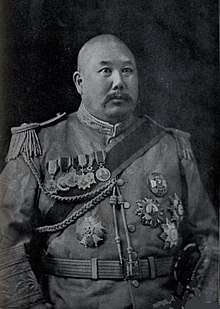Ma Fuxiang
Appearance

Ma Fuxiang (馬福祥) (1876–1932), a Hui, was born in Linxia, Gansu, China. He was named the military governor of Xining, and then of Altay, in Qing times. He held a large number of military posts in the northwestern region after the founding of the republic.
| This article about a political figure is a stub. You can help out with Wikiquote by expanding it! |
Sourced
[edit]- "They have not enjoyed the educational and political privileges of the Han chinese, and they are in many respects primitive. But they know the meaning of fidelity, and if I say 'do this, although it means death,' they cheerfully obey."
- Upton Close (2007). In the Land of the Laughing Buddha – The Adventures of an American Barbarian in China. READ BOOKS. p. 271. ISBN 1-4067-1675-8. Retrieved on 2010-06-28.
- "What, no more? Tell the cook we require ten more courses."
- Upton Close (2007). In the Land of the Laughing Buddha – The Adventures of an American Barbarian in China. READ BOOKS. p. 272. ISBN 1-4067-1675-8. Retrieved on 2010-06-28.
- "Tell the cook, that we will either have ten more courses or the crows will have him."
- Upton Close (2007). In the Land of the Laughing Buddha – The Adventures of an American Barbarian in China. READ BOOKS. p. 272. ISBN 1-4067-1675-8. Retrieved on 2010-06-28.
- "Our Party [the Guomindang] takes the development of the weak and small and resistance to the strong and violent as our sole and most urgent task. This is even more true for those groups which are not of our kind [Ch. fei wo zulei zhe]. Now the peoples [minzu] of Mongolia and Tibet are closely related to us, and we have great affection for one another: our common existence and common honor already have a history of over a thousand years.... Mongolia and Tibet's life and death are China's life and death. China absolutely cannot cause Mongolia and Tibet to break away from China's territory, and Mongolia and Tibet cannot reject China to become independent. At this time, there is not a single nation on earth execept China that will sincerely develop Mongolia and Tibet."
- Jonathan Neaman Lipman (2004). Familiar strangers: a history of Muslims in Northwest China. Seattle: University of Washington Press. p. 167. ISBN 0-295-97644-6. Retrieved on 2010-06-28.
- "Our family members are believers in Islam. We observe Islamic proprieties and behave in good faith. Believing in Allah, cultivating our minds and disposition, we aim to be good human beings. In particular, it is important to be respectful in the implemation of our prayer and our family members ought to observe the rules of prayer."
- Masumi, Matsumoto. The completion of the idea of dual loyalty towards China and Islam. Retrieved on 2010-06-28.
- "If Muslim people do not change their mind in spite of the changes of social conditions, and if we supplement Islamic courtesy and law without explaining and advertising real Islamic beliefs at the same time, then it is impossible to save the minds of the people."
- Masumi, Matsumoto. The completion of the idea of dual loyalty towards China and Islam. Retrieved on 2010-06-28.


